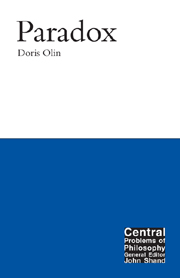Book contents
5 - The lottery paradox
Summary
The paradox
The lottery paradox is the most powerful of the consistency paradoxes, and the greatest threat to the traditional view of consistency. It draws us into a tangle of thorny issues in epistemology, in particular, issues concerning knowledge and justified belief. But the paradox itself is simple and elegant. It depends on one key philosophical premise, the principle of high probability, which can be stated as:
(HP) There is a number n (0.5 < n < 1) such that if P has probability n for S, then S is justified in believing P.
(HP) is motivated largely by the threat of scepticism. The moral many contemporary philosophers have drawn from the Cartesian exploration of the foundations of knowledge is that to insist on evidence that confers absolute certainty is to ensure, as an inevitable consequence, a thoroughgoing scepticism concerning the world around us. For any empirical belief admits of the possibility of error. (Although I believe I am now typing on a keyboard, for instance, it is possible, given my evidence, that I am merely a brain in a vat, being stimulated to have certain sensations.) If requiring certainty for justified belief is setting the bar too high, then it seems the only alternative is a retreat to high probability; and since a probability of 1 is associated with complete certainty, there must be some degree of probability less than 1 that is sufficient to warrant belief - which brings us to (HP).
- Type
- Chapter
- Information
- Paradox , pp. 79 - 104Publisher: Acumen PublishingPrint publication year: 2002



